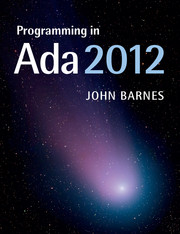Summary
We now come at last to a more detailed discussion of numeric types. There are two categories of numeric types in Ada: integer types and real types. The integer types are subdivided into signed integer types and modular types (these are unsigned). The real types are subdivided into floating point types and fixed point types; the fixed point types are further subdivided into ordinary fixed point types and decimal types.
There are two problems concerning the representation of numeric types in a computer. First, the range will inevitably be restricted and indeed many machines have hardware operations for various ranges so that we can choose our own compromise between range of values and space occupied by values. Secondly, it may not be possible to represent accurately all the possible values of a type. These difficulties cause problems with program portability because the constraints vary from machine to machine. Getting the right balance between portability and performance is not easy. The best performance is achieved by using types that correspond exactly to the hardware. Perfect portability requires using types with precisely identical range and accuracy and identical operations.
Ada recognizes this situation and provides numeric types in ways that allow a programmer to choose the correct balance for the application. High performance can thus be achieved while keeping portability problems to a minimum.
We start by discussing integer types because these are somewhat simpler since they are parameterized only by their range whereas the real types are parameterized by both range and accuracy.
Information
- Type
- Chapter
- Information
- Programming in Ada 2012 , pp. 417 - 438Publisher: Cambridge University PressPrint publication year: 2014
